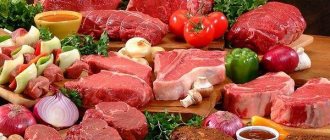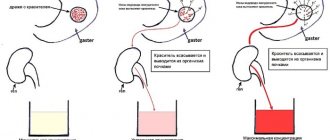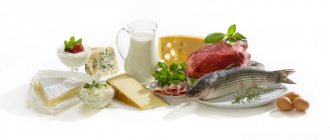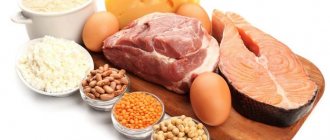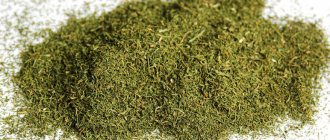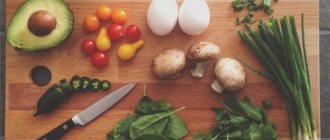Most women try in every way to avoid being overweight. This also applies to pregnant women. With the onset of pregnancy and conception, weight control is very important. A new life is developing in the body of expectant mothers, which needs nutrition and vitamins. Therefore, girls begin to eat food in double quantities.
During pregnancy, every added kilogram can play a cruel joke and lead to serious consequences. This is fraught with the development of late toxicosis, significant swelling of the whole body in the later stages, and hypoxia. In addition, the woman herself will experience severe discomfort while walking and performing household chores. Also, due to excess weight, childbirth does not always go smoothly.
Features of a protein diet for pregnant women
A protein-plant diet during pregnancy is not a strict calorie restriction, but a nutritious diet that allows you to maintain normal weight and saturate the fetus with substances useful for development. The diet with this style of eating is varied, so the risk of stress and breakdowns is minimal. In addition, the likelihood of edema is reduced, and the woman tolerates toxicosis and childbirth more easily. A protein diet is suitable for pregnant women who are prone to obesity, who are overweight, or who want to quickly restore their original physical shape after childbirth.
The peculiarity of the protein diet is that the amount of proteins in the diet increases, and carbohydrates and fats are significantly reduced. But the proportions of BJU (proteins, fats, carbohydrates) during pregnancy should be adjusted by the doctor who observes the woman. If the calculation is incorrect, metabolic processes are disrupted and the load on the kidneys increases. To avoid complications, the expectant mother should consult a doctor. He will create a menu taking into account the duration of pregnancy, the initial weight and condition of the woman.
What pregnant women should eat: 12 healthiest foods during pregnancy
Now we will look at protein and its role for the body of a pregnant woman and her child, and also talk about products containing protein.
You need to understand that a pregnant woman needs more than just calories. She needs healthy and nutritious food for the normal development of the child. Some vitamins and microelements are most important only at certain stages of pregnancy. For example, folic acid (vitamin B9) is important throughout pregnancy, but is especially needed in early pregnancy when the baby's neural tube is forming.
Contraindications
Relative contraindications to protein nutrition include insufficient weight gain, then a protein diet can cause harm to the expectant mother or fetus.
This style of eating should be abandoned if the following symptoms appear:
- nausea, vomiting, constipation and other digestive disorders;
- excessive sweating;
- cloudy urine, strong odor, pain when emptying the bladder;
- rash, itching on the skin;
- irritability, drowsiness, dizziness, etc.
Important! If such signs appear, you should consult a doctor. A protein diet is contraindicated for people with heart problems, hepatitis or other liver diseases. This style of eating should be abandoned if you have kidney disease, the presence of stones in the gallbladder or its ducts, chronic gastrointestinal pathologies, or the presence of cancer.
Protein Digestibility
The digestibility of animal proteins is significantly higher than that of plant proteins. Plant proteins have a dense shell, which makes it difficult for them to penetrate into cells. Proteins of animal origin are absorbed almost completely, 93–96%. While plant proteins can be absorbed by 80% if they are cereals or vegetables, and by 70% if they are legumes. If it is a protein from higher mushrooms, then it will be absorbed by a maximum of 40%. For better protein absorption, you need to take into account the characteristics of the female body during pregnancy. For example, in people with high stomach acidity, digestibility will be better. While people with low acidity will experience unpleasant and sometimes painful sensations.
Principles of nutrition
Pregnant women on a protein diet must follow these rules:
- Eliminate simple carbohydrates and saturated fats from your diet.
- Correctly determine the optimal proportions of proteins, complex carbohydrates and healthy fats. The optimal daily dose of protein is no more than 100-120 g.
- Correctly divide the daily dose of protein: for breakfast - 30% of the daily requirement, lunch - 15%, lunch - 40%, afternoon snack - 5%, dinner - 10%. These values are approximate; your doctor will help you determine them accurately.
- Take food in small portions 4-5 times a day with an interval of 2.5-3 hours.
- Drink 1.5 liters of liquid per day. If you are prone to edema, the expectant mother should drink about 900 ml of water per day.
- Gradually increase the diet during pregnancy: in the 1st trimester - by 100 kcal, in the 2nd trimester - 150 kcal, and from the 6th month - by 300-500 kcal.
- Replenish the diet with proteins of plant and animal origin (about 70-80% of the total amount).
- During one meal, eat 1 serving of protein food.
- Products should be consumed fresh, boiled, steamed, stewed or baked (without oil).
In addition, during a protein diet during pregnancy, it is recommended to take a multivitamin complex prescribed by the doctor. This is necessary to compensate for the lack of nutrients.
Let's summarize
Proper nutrition and natural products will help your baby avoid chronic diseases, because he eats the same things his mother eats. Watch your figure even during pregnancy and follow the recommendations of specialists. Let's highlight the main positions:
- Sleep well. Healthy sleep is always important, and especially during pregnancy. You need to sleep at least 8 hours a day.
- After waking up, drink a glass of plain water and do some exercise to wake up your body.
- Then invigorate yourself with a contrast shower and have breakfast.
- During the day, try not to get overtired; if you do household chores, take breaks.
- Before eating, drink a glass of water.
- If your next meal is still far away and you feel hungry, have a light snack: yogurt or kefir.
- Take more walks in the fresh air, especially before bed.
- Physical activity can be replaced by visiting the pool or going out into nature.
Smile more often, because smiling lifts your spirits. Remember that the baby in your belly senses its mother's mood.
List of prohibited and permitted products
On a protein diet, the expectant mother can eat meat and fish. These are the main sources of protein. It is better to give preference to turkey, rabbit, veal, beef, etc. It is important to buy natural products. The liver and heart are rich in proteins.
Meat dishes should be alternated with fish. The best sources of protein: tuna, chum salmon, pink salmon, salmon, saury, halibut, herring, pollock, mackerel.
You should eat seafood in moderation: shrimp, squid, mussels, caviar (pollock, sturgeon). This is due to the fact that they have a high concentration of protein, so there is a risk of digestive disorders.
Attention! Chicken and quail eggs are an excellent source of protein. When boiled, the product is absorbed by the body by 98%. But you need to eat eggs in moderation, as the risk of allergies is high.
During pregnancy, women should consume fermented milk products, which, in addition to protein, contain calcium. It is important to supplement your diet with cheese, feta cheese, cottage cheese, kefir, natural yogurt, milk, etc. When on a protein diet, you should buy natural products without preservatives, flavors, or flavor enhancers.
The diet should also be supplemented with the following protein sources:
- sunflower seeds;
- hazelnuts, almonds, peanuts, walnuts (in moderation);
- olive, corn, linseed oil;
- buckwheat, millet, oatmeal, rice.
Beans, peas, and chickpeas are rich in protein, but they cause increased gas formation. They can be consumed at the beginning of pregnancy, but closer to the 12-13th week, legumes should be excluded or eaten no more than once a week. For the same reason, you should give up cabbage, grapes and mushrooms .
Products prohibited on a protein diet include:
- sausages;
- yogurt with sugar and chemical additives;
- protein shakes;
- fatty cheese;
- protein bars;
- fatty meats, such as pork, lamb.
This list can be supplemented with sweets with biscuit dough and fatty creams.
Sample menu for every day
The diet for a protein diet should consist of a list of permitted foods. The morning and evening dose of protein is less than the lunch dose. Main meals need to be diluted with additional ones. During lunch, afternoon snack or second dinner, you can eat fermented milk products, biscuits, fruits, vegetables, dried fruits or nuts.
Menu for a protein diet for pregnant women
Day 1:
- muesli with milk, green tea;
- biscuits, kefir;
- vegetable soup, boiled beef, salad with tomato and cucumber, a piece of rye bread, compote or tea;
- vegetable or fruit salad;
- rice with baked fish, stewed cabbage, green tea.
Day 2:
- cottage cheese with honey, dried fruits, green tea;
- sandwich with cheese and herbs, tea;
- baked veal with steamed broccoli, sorrel borscht, a slice of black bread, dried fruit soup;
- a handful of nuts, fermented baked milk;
- boiled fish, salad with tomatoes, bell peppers, tea.
Day 3:
- 2 soft-boiled eggs, rye bread toast, herbal tea;
- grated apple with carrots and honey;
- soup with beans and chicken breast, sliced vegetables, tea;
- a handful of dried apricots, fermented baked milk;
- cottage cheese casserole with prunes, dried apricots, tea.
Nutrition table by trimester
The choice of products for a protein diet depends on the duration of pregnancy, as well as the changes that occur in the body of the expectant mother. The amount of protein should be increased gradually and the woman’s condition monitored. If calculated correctly, pregnant women tolerate a protein diet well, and there are no adverse reactions.
The approximate composition of products and the daily protein intake for pregnant women at different stages can be found in the following table:
| Pregnancy period | Daily protein intake (g) | The most useful protein foods |
| I trimester | 60-85 |
1-2 times a week you can eat beans, beans, peas, cabbage. |
| II trimester | About 100 |
|
| III trimester | Up to 120 |
|
In the 1st trimester, the formation of the main organs of the fetus occurs (brain, spine, heart, blood vessels), so a woman must supplement her diet with protein, folic acid, zinc, and selenium. Thanks to iodine, vitamin C and group B elements, the symptoms of toxicosis will decrease and the formation of the thyroid gland in the fetus will improve. To do this, the main menu needs to be supplemented with seaweed, bran bread, freshly squeezed juices (for example, apple and celery), sea fish, avocado, cauliflower, broccoli, spinach, and herbs. Also, the protein diet in the 1st trimester is diluted with nuts, dried fruits, citrus fruits, apples, carrots, beets, etc. Oatmeal, buckwheat, and rice are healthy.
Important! The optimal dose of protein up to the 13th week of pregnancy is at least 1.5 g per 1 kg.
For the active development of all systems, from the 2nd trimester a woman should consume 2 g of protein per 1 kg. Also, during a protein diet, you need to provide the body with calcium and vitamin D. At this stage, you need to limit the amount of salt and carbohydrates, as they can increase weight. You should also control the volume of water, the excess of which can lead to swelling.
In the 3rd trimester, it is better to eat less, but of high quality. In addition to protein, the protein diet is supplemented with complex carbohydrates and calcium. A woman can consume all products from the 2nd trimester. It is recommended to consume meat no more than 4 times a week, and before childbirth - no more than 2 times in 7 days. In addition, it is recommended to reduce the amount of liquid to 1 liter and salt to 5 g per day. At this stage, it is better to give up simple carbohydrates so that the weight of the fetus is not too high and the birth is easier. Therefore, it is better to prefer soup or salad to porridge and sweet tea with cookies.
Types of proteins
It's worth knowing that not all proteins are the same. The body needs 20 amino acids, 11 of which it produces itself. The remaining 9 are called essential and must come from food and are very important for you and the baby you are carrying. It is very important that all 9 amino acids enter the body at the same time. Some amount of each of the 9 amino acids is found in animal foods, except gelatin. Although gelatin is animal-based, it lacks amino acids, so it will not be able to lay down new cells in your tissues.
Proteins of plant origin contain most of the essential amino acids, but, unfortunately, some of them may be missing. Such proteins are called inferior. They have less biological value. Accordingly, they will not be able to restore tissue. But if you combine plant proteins with others that contain the missing amino acids, then your and your baby’s bodies will receive the required amount.
Vegetarians or women who prefer plant-based foods need to carefully monitor their protein intake. The main thing is to combine foods correctly to get the right amount of amino acids. Here are examples of some complete meals: cheese with noodles, beans with rice or sesame seeds, whole grain bread with peanut butter.
Main conclusions
A protein diet is a great way to avoid gaining extra pounds during pregnancy. To lose weight, stay in shape or quickly recover after childbirth and ensure the full development of the fetus, you need to follow these rules:
- Before following this diet, you should consult your doctor.
- Eat protein foods, complex carbohydrates, and some healthy fats.
- Eliminate or significantly limit simple carbohydrates and saturated fats in the menu.
- Correctly calculate the daily protein intake, depending on the stage of pregnancy.
- Replenish your diet with dairy products, lean meat, fish, eggs, seafood, offal, nuts, seeds, and some cereals. Legumes and cabbage should be consumed with caution, as they cause increased gas formation.
- You need to eat 4-5 times a day, but in small portions.
- The largest dose of protein falls at lunch.
- It is important to maintain a drinking regime.
